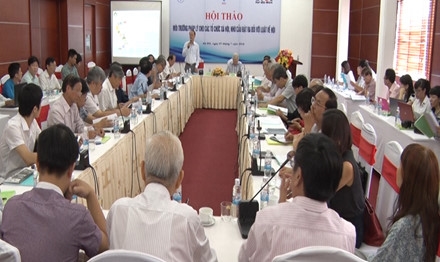 Society
Society

The Government was urged to set up an agency specialising in policy advocacy in order to issue policies that fit the current situation of socio-economic development.
 |
| The Government was urged to set up an agency specialising in policy advocacy in order to issue policies that fit the current situation of socio-economic development. — Photo laodong.com.vn |
HÀ NỘI — The Government was urged to set up an agency specialising in policy advocacy in order to issue policies that fit the current situation of socio-economic development.
The recommendation came after several State policies were recently postponed from taking effect due to shortcomings - for example, Penal Code 2015, said Tạ Ngọc Hải, deputy chairman of the Institute on State Organisational Science under the Ministry of Home Affairs, at a workshop yesterday in Hà Nội.
The workshop was organised by the Việt Nam Union of Science and Technology Associations (VUSTA) to enhance the effectiveness of policy advocacy among social organisations.
At present, only some agencies are working on policy advocacy, including the Chamber of Commerce and Industry, Lawyers Association and Union of Science and Technology Associations. However, the agencies do not specialise in policy advocacy.
Thus, "shortcomings were still found," Hải said.
If a specialised agency is established with a team of leading experts working on policy advocacy, the Government could minimise shortcomings in future policies, he added.
In the meantime, Trần Xuân Việt, a representative of VUSTA, said organisations under the association that work in policy advocacy should improve their ability to do their jobs more effectively.
Việt made the recommendation after statistics from the association showed that only 5-26 per cent of policy advocacy from these organisations were rated at a satisfactory level, and 36-50 per cent were rated average.
Moreover, 106 organisations are working in policy advocacy under the association, but only six have made space for policy advocacy activities on their official websites.
Hải said it is the responsibility of both individuals and organisations to contribute ideas on State policies, but the feedback was lower than expected.
For example, when a State agency submitted its draft policy for public input in order to avoid shortcomings, few people commented. However, after the policy was issued, many made comments criticising it, he said.
This caused problems for policymakers and reduced the effectiveness of policy advocacy among organisations, Hải said.
Policy-issuing agencies sometimes refused to receive consultations from policy advocacy organisations, thus hurting the effectiveness of policy advocacy activities, he said.
Việt said the association’s statistics revealed that up to 50 per cent of policy advocacy from the association received little feedback from agencies issuing policies. — VNS




